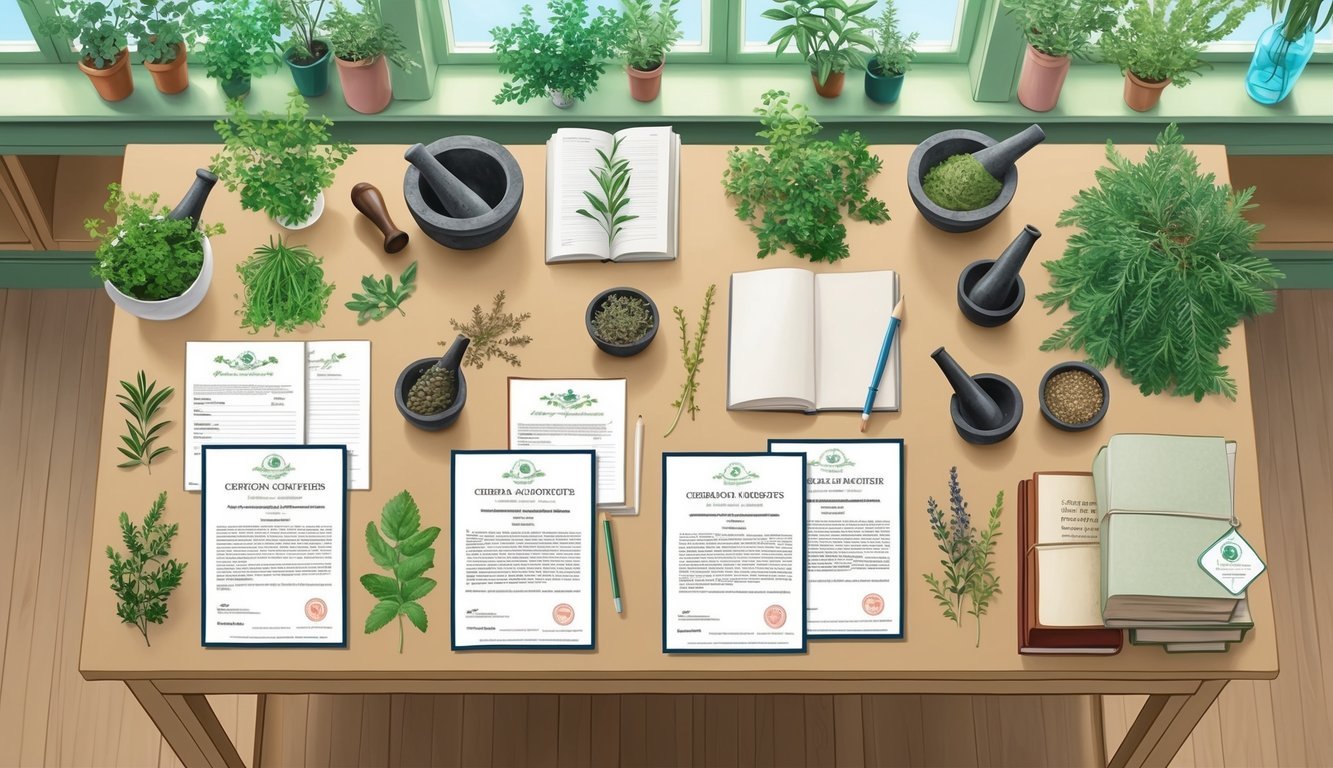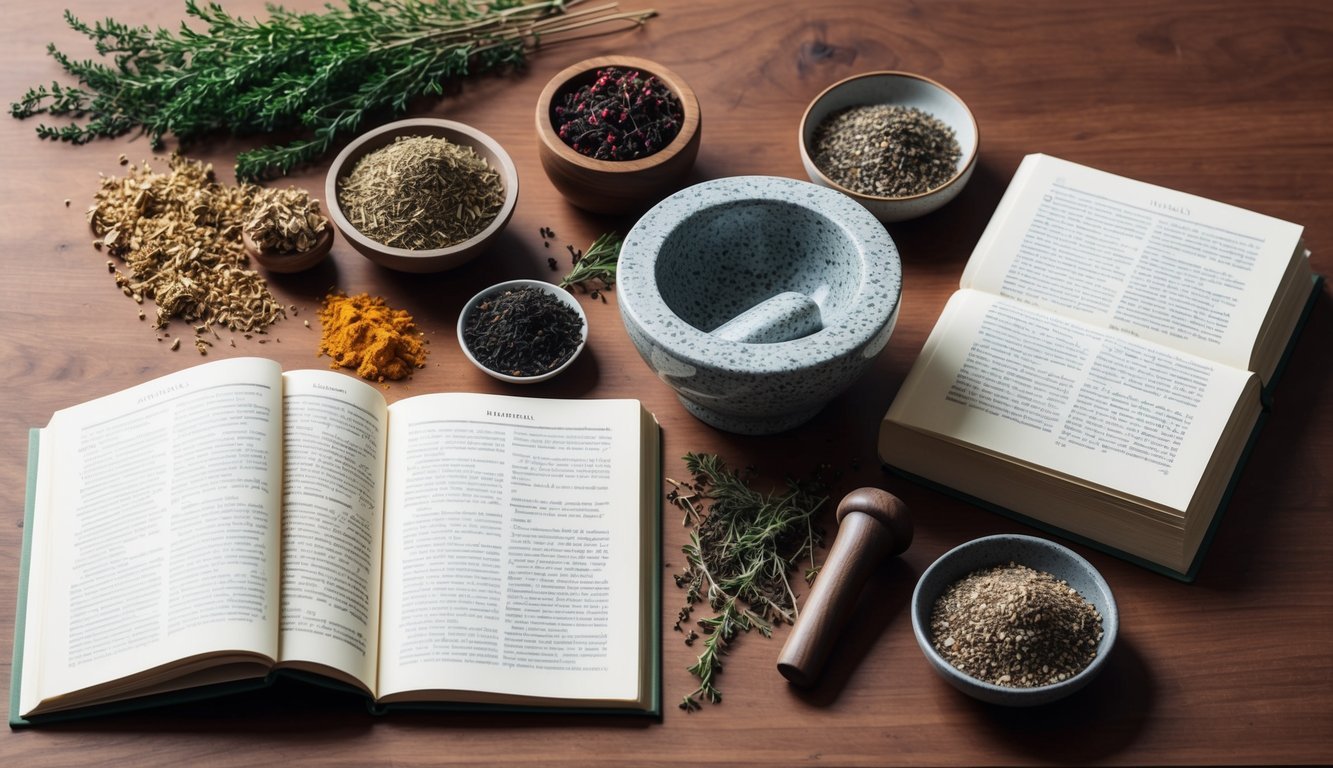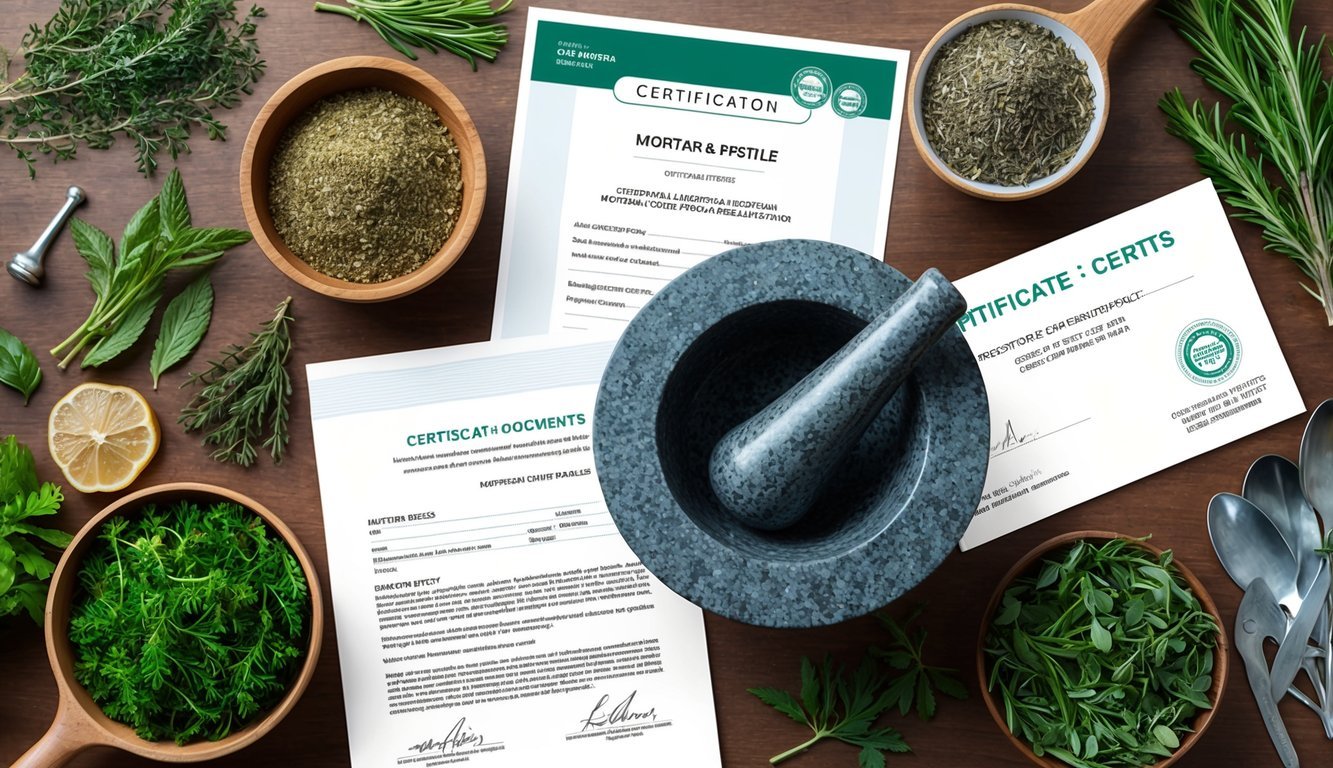“`xml
Ever thought about becoming an herbalist? Using plants for healing isn’t just a trend; it’s a time-honored practice that’s getting some well-deserved attention these days.
If you’re eager to learn how to tap into the healing power of nature, herbalism certification programs can equip you with the skills to do just that.

Getting certified can seriously broaden your horizons in fields like natural health, wellness coaching, and beyond. There are numerous fantastic online and in-person programs to explore.
In this article, I’ll introduce you to five top herbalism certification options that might just be perfect for you.
1) Herbal Academy’s Intermediate Herbal Course

Hey, plant lovers! Ready to take your herbal knowledge up a notch? Check out the Intermediate Herbal Course from the Herbal Academy.
This online gem lets you learn at your own pace—all while enjoying the company of your favorite plants right at home.
You’ll dive into the fascinating world of herbal actions, safety, and side effects.
It’s not just textbook stuff either; you’ll learn how to understand the interplay between herbs and your body.
Want to know which herbs best support your body systems? This course has your back.
And don’t worry—it’s not all about reading! You’ll also get practical skills in herbal therapeutics along with guidance on crafting your own herbal formulations.
It’s kind of like becoming a wizard with plants, minus the wand!
The cherry on top? You’ll get to mingle with a community of fellow herb enthusiasts.
Sharing experiences with people who love plants just as much as you do can be inspiring!
2) Chestnut School of Herbal Medicine’s Herbal Medicine Making Course

Feeling crafty? The Herbal Medicine Making Course from Chestnut School of Herbal Medicine could be right up your alley.
This online program is all about getting your hands dirty (well, metaphorically) by creating your own herbal remedies.
You’ll learn to whip up everything from tinctures to salves, and there are over 100 herbal recipes to try! How cool is that? If you love hands-on learning, most of the video instruction is filmed right in gardens and fields, bringing the plants to life.
If you find yourself loving the experience, the tuition from this course can be applied toward their more extensive Herbal Immersion Course.
How’s that for a sweet deal?
3) The Science & Art of Herbalism by Rosemary Gladstar
If you want to learn from a true expert, check out The Science & Art of Herbalism by Rosemary Gladstar.
This course offers a fantastic overview of herbs and natural healing, packed into 10 lessons you can work through at your own pace.
You’ll cover everything from brewing teas and tinctures to more advanced topics like herbal first aid.
And, guess what? You can choose whether to take it online or opt for the printed version.
With three years to complete it, you won’t have to quit your day job.
Rosemary’s teaching style is approachable—she’s got a knack for making even the tricky stuff easy to grasp.
Plus, the community aspect is a nice touch for anyone starting their herbal journey or looking to broaden their existing knowledge.
You’ll have access to expert instructors and useful resources along the way!
4) Heart of Herbs Herbal School Master Herbalist Program
Ever dreamed of being a master herbalist? The Master Herbalist Bundle from Heart of Herbs Herbal School might be just what you need.
This program offers three certifications: Clinical Herbalist, Clinical Aromatherapy, and Flower Essence Practitioner.
Finish them all, and you can call yourself a Master Herbalist!
Founded in 1998 by Demetria Clark, this school has a wealth of experience in teaching.
Plus, you can complete the whole program online, making it super convenient for your busy schedule.
And the best part? It’s designed to be both enjoyable and budget-friendly—learning about herbs doesn’t have to cost an arm and a leg.
By the time you’re done, you’ll have an impressive understanding of herbs, aromatherapy, and flower essences.
You’ll be well on your way to turning your passion for plants into a skill you can use in everyday life!
5) East West School of Planetary Herbology Professional Herbalist Course

If you’re interested in herbs from around the world, the Professional Herbalist Course from East West School could be your ticket.
This program covers Western, Chinese, and Ayurvedic herbal traditions.
You’ll learn about more than 600 herbs and 264 herbal formulas, plus ways to treat 944 different health conditions with herbal remedies.
Talk about getting a well-rounded education!
The flexible online format means you can learn on your own schedule.
No need to uproot your life or quit your job—just log in and get started when you can.
By the end of the course, you’ll be confident in using herbs safely and effectively.
You’ll even get the scoop on setting up your own herbal practice if that’s where you want to go.
Understanding Herbalism
Herbalism has been around for ages, using plants as a means of healing and promoting wellness.
This ancient practice is still popular today, especially among those looking for natural health solutions.
History and Cultural Significance
Herbs have played key roles in human health for thousands of years.
Ancient Egyptians documented herbs on papyrus scrolls, and Hippocrates—the “Father of Medicine”—used them in his treatments.
In China, herbal medicine has a history of over 5,000 years, with the “Shennong Bencao Jing” being one of the first texts on medicinal plants.
Native American tribes have passed down knowledge about local herbs like echinacea and goldenseal through generations.
During the Middle Ages in Europe, monks cultivated herbs in their monastery gardens, creating remedies and recording their knowledge for posterity.
It’s fascinating how these practices have stood the test of time!
Modern Uses and Benefits
Nowadays, plenty of people are leaning on herbs for natural health support—think immune boosts, stress relief, and better sleep.
Here are a few popular herbs and what they can do for you:
- Chamomile for relaxation.
- Ginger for nausea.
- Peppermint for digestion.
- Echinacea for colds.
Herbal remedies come in various forms, from teas to tinctures and creams.
Some folks even grow their own herb gardens for a fresh supply!
Many herbalism certification programs focus on teaching safe usage of herbs.
You’ll learn about herb properties, dosages, and potential interactions with medications.
What to Look for in a Certification Program

Thinking about which herbalism certification program to choose? A few key factors can guide your decision to find a fit that works for you.
Accreditation and Credentials
Look for programs that come highly recommended within the herbal community.
While there’s no universal accreditation for herbalism in the U.S., some organizations are known for offering quality education.
The American Herbalists Guild is a good starting point, offering a registered herbalist (RH) credential that many practitioners aim for.
And don’t forget to check out the instructors’ backgrounds—you’ll want to learn from knowledgeable folks with real-world experience.
Keep an eye out for any certificates or diplomas that the program offers.
While these aren’t official licenses, they can show what you’ve learned.
Course Structure and Curriculum
Consider how the program is offered.
Online courses, like those from the Herbal Academy, provide flexibility, while in-person classes often give richer hands-on experiences.
Check what the curriculum covers.
A solid program should teach the following:
- Plant identification
- How to prepare herbal remedies
- Safety and dosage guidelines
- Herbs related to body systems
- Clinical skills (if you’re looking to practice)
Make sure there are practical assignments, too.
Getting your hands dirty with tinctures or identifying plants in nature can be super beneficial!
Think about how long the program takes.
Some are quick dives, while others may take years.
Pick one that aligns with your schedule and learning preferences.
Frequently Asked Questions

Herbalism certification programs come with a variety of learning possibilities.
Whether you prefer online or in-person formats, there’s something to fit your lifestyle and goals.
What are the top online programs for herbalist certification?
The Herbal Academy’s Intermediate Herbal Course is one of the most popular picks for online learning.
It covers a broad range of topics and lets you study at your own pace.
The Chestnut School of Herbal Medicine offers an online focus on creating herbal remedies, ideal if hands-on experience is what you’re after.
How long does it usually take to get a herbalist certification?
That can vary quite a bit! Some programs are short—just a few weeks—while others might take 2-3 years of full-time study.
It all depends on how deep you want to dive into the topic.
Are there authentic certifications for herbalists?
It’s well-respected in the community, and you’ll earn a certificate upon completion, all while benefiting from a thorough curriculum.
Is it worth joining the American Herbalist Guild if I’m interested in herbs?
Joining the American Herbalist Guild can be a smart move.
They offer tons of resources and great networking opportunities.
It’s not a requirement to practice herbalism, but it can certainly help.
Should I consider Herbal Academy for my herbal studies?
Herbal Academy often gets recommended for online herbal education.
They offer a variety of courses catering to different skill levels, and many students rave about how user-friendly and informative their programs are.
Which herbalist courses are beginner-friendly?
Heart of Herbs Herbal School has a Master Herbalist Program that’s perfect for newbies, starting with the basics and moving into more advanced topics.
Don’t forget the East West School of Planetary Herbology, which also offers a Professional Herbalist Course great for those just starting out.
It blends the best of both Western and Eastern herbal traditions.
Ready to dive in?
“`

